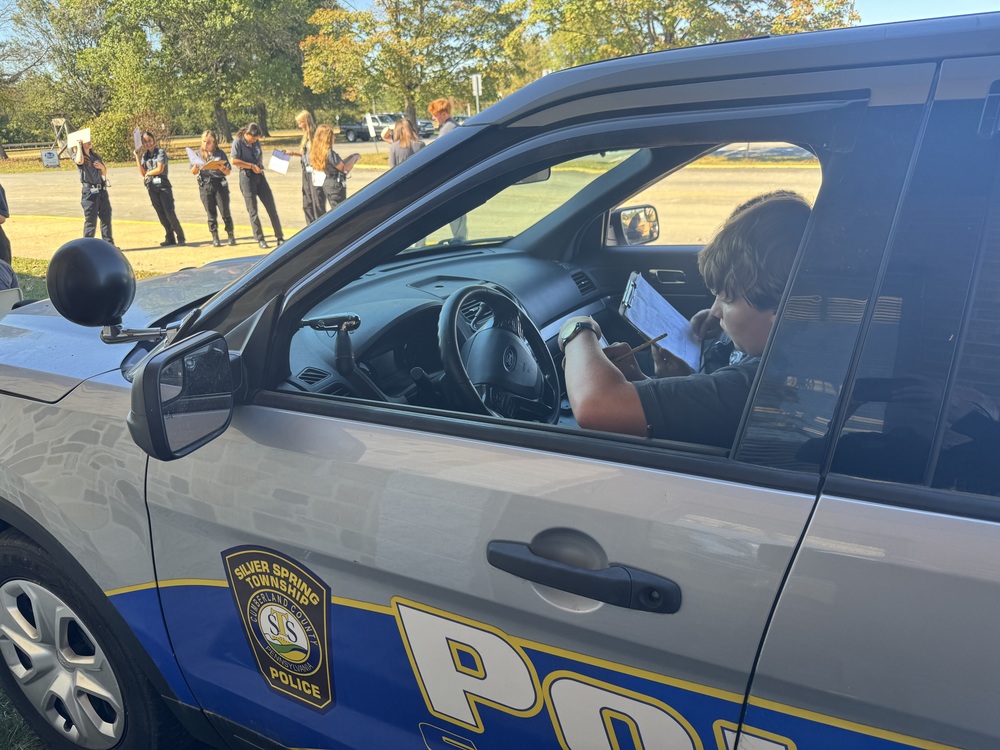Teacher Spotlight- Mr. Weary
What is the most significant new or different aspect to your program this year?
“This is our Traffic Year”.
“Something new I’m doing is having PA State Police Collision and Analysis and Reconstruction Section coming in October for 2 days to give a presentation on traffic accidents and then the students will be given an accident scenario to investigate”.
“A new thing I’m looking forward to is our first Co-Op program with Cumberland County 911 in Spring of 2026. They will come in and teach and certify all our seniors to be 911 dispatchers and then 2 of them will get a paid internship at the 911 center and then possibly lead to a full-time job after graduation. I’m very excited about this opportunity”.
What are some of the more common career pathways your students take when they leave CPACTC?
“They can get into Security Guards positions and be a corrections officer or 911 dispatcher at 18yrs old. I have 3 past students working at Cumberland County Sheriff’s Office, 2 in security and 1 in firearm permits. Other students have gone in the military and others go on to college”.
What training/unit do employers seek that helps students get their foot in the door?
“NIMS 100,200,700,800. CPR/First Aid and the course content that we go over such as traffic stops, Court and Corrections and Crime Scene Process. When students plan and organize our Safety Day event that helps them connect to these agencies and shows how hard they work making a large event turn out great for our school”.
What are some of the recent technologies and/or trends in the profession with which students become familiar?
“Use of body cameras and how they are very important and how law enforcement can use cameras that are everywhere to help solve crimes. Using the digital fingerprint system is very important today as well”.
What unit/topic do students struggle with the most in your program? Why do you think that is?
“Physical Fitness is where I see most students struggle today. I think this is because students spend too much time on electronics and sitting on the couch or in their beds and not out doing physical activities”.
Explain a typical day in your program.
“Our students start with the pledge of allegiance and then line up in the hallway for uniform inspection and then the students do 22 pushups in remembrance of 22 veterans that commit suicide every day. After that I start with announcements and keep students informed of my outside school activities such as training and certifying dog teams. Then I teach a new lesson, and we practice hands on training of that lesson and then we will review previous lessons on handcuffing, pat downs, traffic stops to end the day. Every Friday we do physical fitness training”.
What advice would you give students who have completed your program?
“Do what they want to do, don’t go do a job that you will dislike for the rest of their lives. For those that are getting into law enforcement please stay safe out there”.
How many years have you been at CPACTC?
“This is my 3rd year. This was a big change for me going from a police officer dealing with bad people to now teaching high school students. I’m really enjoying my new career. Safety Day is a large event that my students take pride in setting up and I’m glad to be part of this great team”.
What was your experience before coming to CPACTC?
“I worked at Cumberland County Sheriff’s Office (1998-2007) where I worked on Drug Task force, did prisoner transports and extraditions, courtroom security, courthouse security, traffic duties, responded to calls, served warrants and civil papers, worked special details, handled the first bomb detection dog, was assigned to Penn State Bomb Squad, worked many VIP events”.
“Then went to the U.S. Army War College (2005-2023) as a Sergeant/K9 handler for the police department there. I had 3 more K9s’ in my career for a total of 4. Handled regular police officer calls, was a supervisor, worked dispatch. I was acting Operations Captain for a few months while the position was vacant, did many VIP K9 searches for U.S. Presidents, Vice Presidents, Generals, cabinet members and for the Pope Francis visit to Philadelphia September 2015”.
“While at the War College I was the Chairman of the K9 section of the South-Central Task Force and coordinated dog support for missions and assisted with funding to purchase bomb dogs for law enforcement agencies. I’m still active with this but I stepped down to Co-Chairman”.
“I’m still active in my career today. I’m as Master Trainer for North American Police Work Dog Association for Explosive Detection K9 Teams. So, I can train new handlers and dogs to be explosive detection teams, and I can certify them for a 1-year certification. I can do this for any agency here in the United States or oversees. This does keep me busy on weekends and during my summer while I’m off from school”.
Program Spotlight- Criminal Justice Students (Addison Gonzalez, Lillian Short, Miller , and Andrea Sherman)
Summarize what you learn in your program in ONE SENTENCE (if you can).
“The basics of law enforcement and teamwork”.
“We learn about the various career paths available to us in this field. We learn about the laws and amendments. We also learn hands-on skills related to this field”.
“We learn basics of this job field and perform some of the basic duties”.
“I learn in depth knowledge that pertains to the life-threatening but rewarding career in the Criminal Justice field”.
What is the hardest part of your program?
“Some of the physical elements can be difficult at first, but that is why we train”.
“I would say the physical training is the hardest part. It pushes you to work as a team and pushes us as individuals and our physical capabilities”.
“Memorization of the steps in order for processes, such as traffic stops and handcuffing”.
“I think the hardest part of my program is PT (physical training). Every Friday we either do a fun activity like kickball, or someone comes in to challenge us from different areas of law enforcement. We have done PT with Army, Corrections Officers, and State Police just to name a few. The challenge us to complete the types of exercises they are expected to do regularly as part of their training”.
What is the most fun part of your program?
“Scenarios, and the people you meet, and bonds created over time here”.
“Meeting so many other people that come from all these different school districts and becoming good friends through our common interests”.
“Everything hands-on that we have the opportunity to learn”.
“I personally believe the best part is meeting new people and the challenges. My peers come from several other school districts, and I have become very close to many of them”.
What is some recent technology you are learning to use in your program that is specific to your profession?
“Digital Fingerprinting”.
What is your plan for after high school? BE SPECIFIC!
“Anything entry level related to my field of study. Such as law/court”.
“I plan to attend HACC for one year, then transferring to a Four-year college, where I can finish my bachelor's degree before going into the Criminal Justice field”.
“Going to college for Forensic Science and to play college volleyball”.
“I plan to get a bachelor’s degree in criminal justice or psychology or social work. This is my second year, so I have some time to figure that out. I would like to go to Elizabethtown College. I would love to do something helping children who are the victims of violent crimes”.
What is going to be the highlight of the year?
“Safety Day is the Highlight of the year for Criminal Justice; we organize and run this event”.
“Seeing first year students knowledge grow, seeing them improve in skills and with that watching their confidence also grow”.
“Safety Day Event, and our field trip to the Fort Indiantown Gap Obstacle Course”.
What are you proud of learning how to do in your program?
“I’m most proud of learning how to be a leader, it is very important in this field”.
“The ability to teach others from what I’ve already learned, and creating a fun learning environment”.
“Performing crime scene investigations, because it will be helpful for the job I want to go into”.
“I am proud to be learning better communication skills, interview skills, and leadership skills. These skill sets will directly affect my abilities in my career. I have gained a new appreciation and respect for the work and mental work that goes into this career choice”.
Explain a typical day in shop.
“We arrive, change to uniforms, then go do our inspections. We meet to review what we are doing for that day, and have our lesson given by Mr. Weary”.
“Start with pledge and Inspections. Followed by pushups for PT, and morning announcements. We have a full lesson. Or brief lesson review that leads into a hands-on skills activity and training session”.
“We do inspections after we get dressed. Mr. Weary explains the agenda and we perform the tasks asked and clean the shop before dismissal”.
“Typical day in CJ includes many activities. Attendance/roll call, then changed into uniforms, 22 pushups, and inspections of our uniforms. We sit in the classroom and Mr. Weary assigns us what we are doing for the day, and either its an extensive lesson, or assignment and then dismissed for hands on training experiences”.
How is your program at CPACTC different from other classes you have had in the past? Can you give some examples?
“There is a good balance between paperwork learning, and hands-on working. This helps keep a good variety, so we aren’t doing the same thing every day. Our schedule is very flexible”.
“Real world and pertains to what I want to do for a living. Hands-on, physical learning and theory lessons. Very teamwork-based lessons. More relaxed environment, I don’t ever feel like I’m at school when I am here”.
“We learn things you wouldn’t in a regular high school setting. We are also given many opportunities you would get, such as visits from Police Dogs and their Human Partners, and Explosives experts”. “Whatever we are learning, we typically get to see in-person also or learn and then perform the skill we just learned”.
What advice would you give to a beginning Level 1 student who is just starting the program or to a student who is considering enrolling in your program at CPACTC?
“Be prepared to push yourself.” This program may require mental toughness and physical. Pay Attention! There are crucial parts of the process that shouldn’t be skipped, so listen to the details”.
“Take the chance and do it!” You will meet amazing people and have so much fun. This program has also been useful for learning self-defense and protection/awareness in everyday life”.
“If you are considering enrollment in CJ, you need to pay attention to what you are learning intently. Keep yourself organized. You will have a smooth transition if you do both things. They are keys to success in this program”.
“It is okay to be scared/intimidated to come here and be in this program. I was extremely scared. I didn’t have friends coming here, and I didn’t know the teacher, and the environment was new. But once I got here, and then got my mentor, I was able to open up to her.

